This February and March (and a little bit of April), we’re taking a look at the 1995 to 1996 season of Star Trek, including Star Trek: Deep Space Nine and Star Trek: Voyager. Check back daily for the latest review.
The second season of Star Trek: Voyager was a disaster.
There is no other way to describe it. The second season of Voyager is a messy run populated with malformed episodes and terrible creative decisions, compounded by the sense that the production team has turned upon itself and the network is feeling more and more uncomfortable with its flagship show. The first season of Voyager had debuted at the franchise’s cultural zenith, as the cast of Star Trek: The Next Generation transitioned to the big screen with Star Trek: Generations and as Paramount chose the franchise to be the cornerstone of its new network.
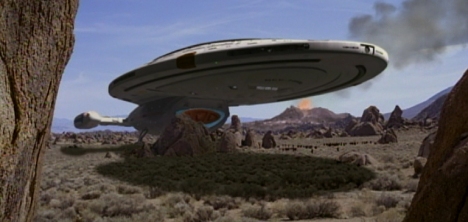
However, there was very clearly trouble in paradise. It could be argued that Voyager was in a large part the victim of the franchise’s success. Frustration over how Paramount chose to assign the writing duties for Generations led Michael Piller to divorce himself from the franchise to develop other ideas.While UPN was very lucky to have a show like Voyager, the network consciously pushed the production team away from narrative experimentation in favour of cookie-cutter plotting.
The basic premise of “Starfleet and Maquis find themselves roughing it in the Delta Quadrant” was eroded surprisingly quickly over the course of that first year. All the Maquis crew members were in Starfleet uniforms by the start of Parallax. Any hint of conflict between the two was downplayed with a joint Starfleet and Maquis mutiny in Prime Factors. Luxury items like the holodeck were able to run in episodes like Heroes and Demons and Cathexis. A Romulan guest starred in Eye of the Needle. So the first season betrayed a lot of what made the initial idea interesting.
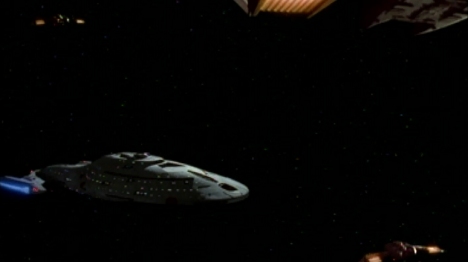
The second season represented an attempt to roll back some of these changes. Michael Piller returned to the writers’ room at the start of the second season, following the failure of his show Legend. Piller immediately began reintroducing elements that the production team had downplayed in his absence. The result was a clear tension between a showrunner and his staff, with each fighting frantically to overwrite each others’ version of the show. The result was the worst of all possible worlds.
Piller got his way in some respects. The Kazon returned in Initiations after an absence of half a season, and came to dominate the show’s sophomore year to the frustration of the writing staff, the actors and the fans. Tom Paris reverted to a sleazy womanising rebel in episodes like Non Sequitur, Parturition and Investigations. Seska became a recurring foil in Manoeuvres and Alliances. The divisions between the Maquis the Starfleet crew came up in stories like Meld and Investigations.
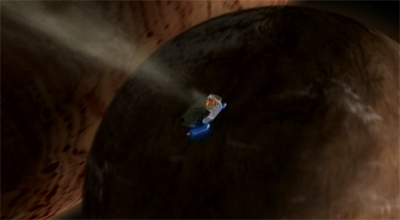
However, there was a clear sense that the show was being pulled in dozens of different directions from moment-to-moment. Jeri Taylor pitched a slower and more emotive form of storytelling in episodes like Persistence of Vision and Resolutions. Brannon Braga was writing pulpy science-fiction horror in episodes like Cold Fire and Threshold. The Alpha Quadrant was never more than a stone’s throw away in episode like Non Sequitur, Dreadnought or Death Wish. The aesthetic of the original Star Trek was evoked in Innocence, The Thaw and Tuvix.
However, this sort of conflict between different creative visions of Voyager was not simply played out across separate episodes; it was often played out within episodes themselves. Alliances and Investigations were episodes very firmly tied to Michael Piller’s vision of the show, but they were both written by Jeri Taylor who objected loudly and repeatedly to his focus on the Kazon. Indeed, Investigations seems to have been written to provide the most anticlimactic conclusion imaginable to Piller’s long-form Kazon arc.
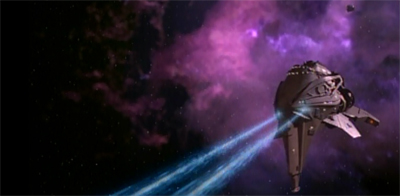
Piller outsourced a lot of the development of the Kazon to writer Kenneth Biller. Not only was Biller responsible for the scripts to Initiations and Manoeuvres, but he was also the writer that Piller tasked with preparing a memo fleshing out and developing Kazon culture. Biller seemed to spend most of his time in the fan press mocking and ridiculing the Kazon, putting Piller in the strange position of seeing his largest experiment implemented by writers who were publicly and vocally opposed to it.
(This issue was perhaps taken to its logical conclusion with Piller’s script for Basics, Part II. Although credited to Piller, his original intent was butchered at the behest of the rest of the writing staff. Piller’s final credited script for the show erased a lot of the elements he had worked so hard to develop through the second season; Seska’s child was conveniently not Chakotay’s son, Lon Suder was neatly killed off, the Kazon disappeared only to appear in flashbacks and distorted historical records. Piller could not even realise his vision for the show in his own scripts.)
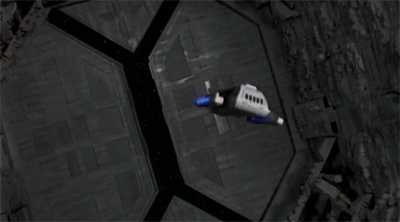
None of this is to let Michael Piller off the hook for his own spectacular errors in judgment during the season. Piller might have been attempting to use Tattoo to demonstrate a faster choppier narrative style that reflected the accelerated pacing of contemporary television, but that is not the most memorable attribute of the episode; Tattoo is essentially an episode about how the bulk of Native American culture is the result of contact with (conspicuously white) aliens they mistook as gods. (Okay, “Sky Spirits.”)
Even if Piller did not write most of the Kazon episodes, he is still in some sense responsible for the horribly racial caricatures that they became, with Initiations attempting to use the Kazon as a metaphor for Los Angeles street gangs who happened to be descended from a race of former slaves who were coded as a race of primitive savages who live in acrid desert climates. To be fair, this problem was apparent from as early as Caretaker, but the decision to return to the Kazon and double down on their more unfortunate attributes feels somewhat ill-judged.
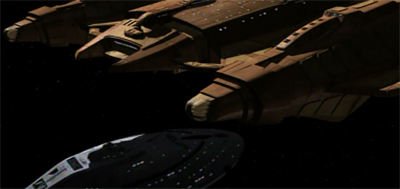
(Not that the awkward racially coded subtext is the only unfortunate storytelling decision about the Kazon. With her plot to harvest Chakotay’s DNA to impregnate herself in Manoeuvres, Seska is transformed from a duplicitous and manipulative antagonist into a baby-crazed sexist stereotype. Along with the Kazon, this version of Seska feels like she escaped from a pulpy fifties paperback, which may explain a lot of Piller’s choices when it came to characterising Hanon IV in Basics, Part II.)
Even getting past the writing staff’s obvious indifference to his ideas and the fact that many of those ideas were just terrible, Michael Piller’s vision for the second season of Voyager ran into other problems. Quite simply, even the good ideas were implemented terribly. For example, it is a good idea to use long-form storytelling on a series like Voyager that has internal conflict, a potentially large cast trapped in a confined location together, and a clear objective to accomplish by the end of the production run.
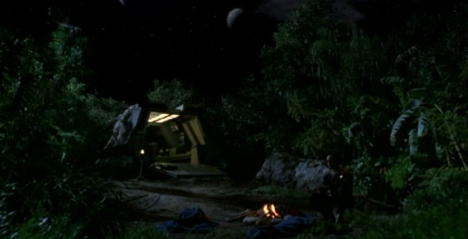
Voyager is a ship about people who shouldn’t get along working together to accomplish a very specific goal. As with the basic premise of Star Trek: Deep Space Nine, the central thread lends itself to serialisation and development. How do the crew integrate? How do they adapt to their unique situations? What happens when they have to fend for themselves? How do they sustain themselves without access to support infrastructure? What efforts are they making to get home quicker?
Piller seemed to understand that television (and genre television in particular) was shifting away from episodic storytelling towards a longer-form mode of storytelling. Of course, there had been serialised prime-time dramas before, like Dallas and Dynasty, but the poor syndication sales of those shows had made networks nervous. During the mid to late nineties, serialisation was creeping back in thanks to the popularity of shows like The X-Files and the emergence of shows like Babylon 5. History would vindicate Piller’s arguments for serialisation.
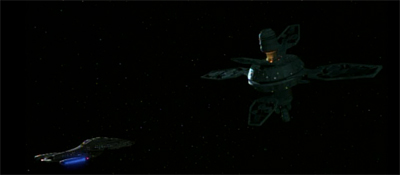
However, history would not vindicate Piller’s attempts at serialisation. Quite frankly, Piller had no idea how to write a compelling long-form story. Instead of rooting his long-form narrative elements in character development or recurring themes, he built them around external factors. The character of Michael Jonas was introduced for the sole purpose of this arc, selling Voyager out to the Kazon. Tom Paris was involved in a needless complicated subterfuge that was concealed from both the audience and Chakotay for the vaguest of reasons.
The second season of Voyager aired at the same time as the fourth season of Deep Space Nine, which did a much job at embracing serialisation for quieter character moments. The flirtation between Worf and Dax played out through a conversation about the best Klingon weapons that was spread across multiple episodes. Rom slowly came into his own as an engineer, setting up a late-season career change. All of these elements felt organic and natural, an example of writers simply building and elaborating upon smaller elements that had worked before.

In contrast, the Jonas plot on Voyager does not work. It feels awkward shoehorned into various episodes, existing only so the production team can boast about having a long-form arc. More than that, these elements distract from otherwise strong standalone stories. Meld and Lifesigns rank among the strongest episodes of the season – if not the entire seven-season run – but they suffer when the primary plot has to give way to a “runner” about how Jonas is helping the Kazon or Paris is not fitting in properly.
These elements were ill-judged; it is no wonder that the remaining seasons of Voyager were so conservative and unambitious. Voyager had tried experimentation and innovation, only to see those elements backfire horribly and leave the writing staff shattered. As much as Piller is trying to push Voyager to become a bolder piece of television, there is also a sense watching the second season that the writers are settling into a comfortable groove. After all, Voyager was launched when the franchise was at its peak. Why mess with a winning formula?
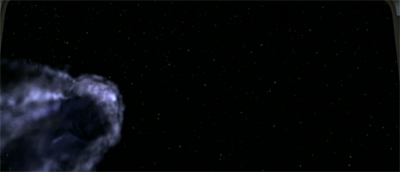
The third and fourth seasons would really codify the Voyager format, the rigid insistence that the status quo be restored at the end of every episode. Nevertheless, there is a creeping sense of certainty about life on Voyager across the second season as a whole, as if the characters themselves are aware of the force that the familiar exerts upon the narrative, the strange gravity that pulls everything back to its place for the start of the very next episode. Voyager will never change. It will always be the same.
This is perhaps most obvious in Deadlock, Brannon Braga’s thrilling science-fiction action adventure that handily sets up the recurring motif of destroying Voyager only to conveniently reset everything at the end of the episode. Deadlock is a fantastic piece of television, but it is very clearly setting the template for Year of Hell, Part II, Course: Oblivion and Timeless. As with any dazzling trick, that twist loses some impact with each iteration. Even apocalyptic action is susceptible to the law of diminishing returns.
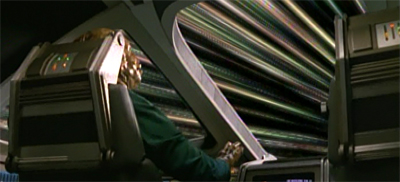
Deadlock is just the most overt example. Across the second season, it seems like Janeway is motivated primarily by the decision that will not alter the status quo. In Manouevres, she refuses to punish Chakotay for mutiny; she argues that he is too valuable to lose, even if the character chould have been punished off-screen. (Janeway had similarly declined to punish Torres and Tuvok in Prime Factors.) However, Janeway is perfectly willing to order the cold-blooded murder of the eponymous character in Tuvix, because it restores the opening credits cast.
There is something very rote and familiar about all this. Because the status quo is such a powerful narrative force, it seems like the characters themselves are unwilling to embrace change or movement. The second season repeatedly teases the idea of some or all of the cast getting home, but there is never any emotional depth that possibility. The audience obviously knows that Janeway and her crew will not be returning home two seasons into a seven-season run, but it frequently seems like the characters know that as well.
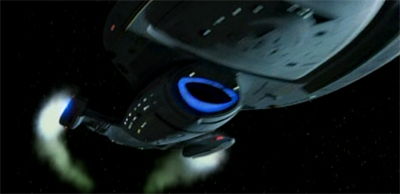
After Janeway defeats Suspiria in Cold Fire, she does not broach the possibility of returning the crew home. In fact, it seems like the return of the Nacene in Cold Fire was intended to close the possibility of the crew getting home before the show completed its run. When Janeway encounters Q and Quinn in Death Wish, she never asks either to send the ship home. Sure, it would be a violation of her impartiality during the hearing on Quinn’s request for asylum, but what about either before or afterwards? Or as a gesture of good will from both parties before the hearing?
In fact, it seems like the only reason that Harry wants to return to Voyager in Non Sequitur is because Garrett Wang’s name happens to be in the opening credits. Harry is so desperate to return to the ship that he never stops to think about what being on Earth could mean for the crew lost on the other side of the galaxy. Harry is the only person who knows that Voyager is still out there, but the show is so eager to reset the status quo that Harry never stops to properly process what has happened.
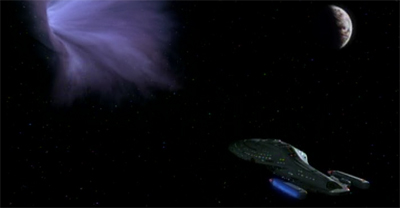
Although not part of the broadcast season, False Profits reinforces this sense that the crew is aware that they will not get home ahead of schedule. Produced as part of the final production block and pushed back until the start of the following season, False Profits has the crew discover a wormhole back to the Alpha Quadrant. However, nobody on the crew seems to get too excited, as if aware on some primal level that the wormhole only exists to ensure that the Ferengi guest stars do not become a recurring concern. Nobody is too disappointed when the wormhole disappears.
Even in Threshold there is a sense that none of the crew are really too excited about the possibility of returning to Earth. Tom Paris cracks the warp ten barrier, turning into a grotesque b-movie salmon monster in the process. However, the EMH devises a way to cure Paris of that strange affliction. In theory, this means that everybody on the ship could go through transwarp back to Earth. In fact, the crew could even just send Paris with a dose the antidote in order to let Starfleet know where they are. However, this idea is never even mentioned.
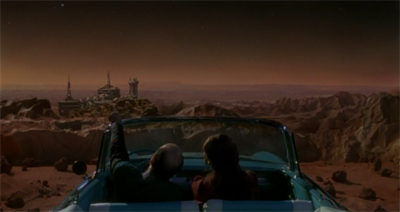
Of course, it is hard to believe that the Voyager crew could ever get homesick. The second season of Voyager is packed with familiar elements from the Alpha Quadrant. Projections was produced during the show’s first season, but broadcast during its second; the episode features Dwight Schultz reprising his role as Lieutenant Barclay from The Next Generation. Later in the season, Death Wish features guest appearances from Next Generation alumni John DeLancie and Jonathan Frakes.
Earth itself makes appearances in both Non Sequitur and more briefly in Death Wish. Janeway visits a holographic Earth in Persistence of Vision while the EMH basks in the holographic Earthlight in Lifesigns. That is to say nothing of the recurring use of Chez Sandrínes, a little piece of Earth tucked away on the holodeck. A Cardassian missile turns up in Dreadnought. Janeway and Tuvok journey back to the Alpha Quadrant in Flashback. The Ferengi return in False Profits. The first two-parter of the third season will send the crew back to present-day Earth.

For all that Voyager was supposed to get away from the standard Star Trek tropes and aliens, it seems to luxuriate in them. In fact, it seems likely that Voyager spends far more time on Earth (and facsimiles of Earth) than The Next Generation or Deep Space Nine. As a result, the show never feels properly lost or divorced from what came before. The show is meant to be about a crew lost on the other side of the galaxy, but they spend far too much time running into people they know from past lives.
The second season of Voyager is a spectacular failure. While the individual quality of the episodes is (noticeably, if not emphatically) stronger than it was during the first two seasons of The Next Generation, there is less of a sense of purpose and a stronger sense of confusion and disorienting. This is striking, because the first two seasons of The Next Generation were largely about figuring out how to do Star Trek on television after a seventeen-year hiatus. The second season of Voyager arrives after eight years of solid production, but seems amateurish and clumsy.
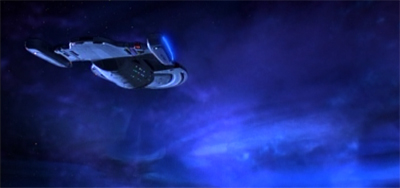
Perhaps the most infuriating aspect of all this is that the show seems reluctant to try anything new or striking or bold. Piller’s experiments were horribly ill-judged and out-of-touch, but there is a definite sense of inertia around his efforts to push the show’s storytelling towards something more ambitious. Watching the second season of Voyager, there is a recurring sense that the show is resting on its laurels, that it does not see a need to change or grow. There is a perverse confidence to the second season, one that does not feel earned given the quality of the season as a whole.
However, the second season does serve as something of an exorcism for the series – and, arguably for the franchise. Given that Deep Space Nine would ultimately prove to be a severed evolutionary limb in the grand history of the larger Star Trek franchise, it is the second season of Voyager that sets the tone for the future of the Star Trek universe. The second season of Voyager marks the point at which the Star Trek franchise consciously and decisively rejects change as something potentially frustrating and highly unnecessary.

The second season ends with the departure of Michael Piller, the producer largely responsible for a lot of behind-the-scenes tension and terrible storytelling decisions. In a way, the rest of Voyager feels like a reaction to the trauma of this second season. If evolution is something as painful as Alliances or Investigations, then why bother with it? Voyager was still coasting off the franchise’s cultural zenith. It is easy to understand why the production team felt that they could simply reject the very idea of change rather than these particular misguided changes.
The second season of Voyager is a terrible and informative season of television. While Voyager does not entirely commit to what it wants to be during this stretch of the run, it does firmly decide what it doesn’t want to be under any set of circumstances. That can be just as important.
You might be interested in our other reviews from the second season of Star Trek: Voyager:
- The 37’s
- Initiations
- Projections
- Elogium
- Non Sequitur
- Twisted
- Parturition
- Persistence of Vision
- Tattoo
- Cold Fire
- Manoeuvres
- Resistance
- Prototype
- Alliances
- Threshold
- Meld
- Dreadnought
- Death Wish
- Lifesigns
- Investigations
- Deadlock
- Innocence
- The Thaw
- Tuvix
- Resolutions
- Basics, Part I
Episodes produced during the second season, but carried over to the third:
Filed under: Voyager | Tagged: Michael Piller, star trek, star trek: voyager |




















I would be interested to know fan opinions of the time. It was still early days for the internet. If you wanted the inside scoop (and many fans were plainly NOT ready for what they learned) you had to attend conventions and follow the hollywood press. There are no TV critics in the United States as such. Television is treated with kid’s gloves much of the time.
I know by the time Braga took over, Voyager had started to leak controversy. But that’s far in the future.
Part of me wonders if any of this Piller vs. Taylor vs. Biller stuff would have played out in the press even five years later, when the internet made it all ubiquitous. It’s interesting to have it all laid out in a way that the workings and conflicts of the Braga era are not. (They are largely inferred and whispered, not played out across the pages of Cinefantastique, fandom’s paper of record.)
VOY was sort of the Phantom Menace of the franchise. No one realized how lackluster it was until social media because a thing, and they could compare notes. (A testament to the power of groupthink and branding.) And then it became popular to *not* like it, which in turn created a pro-Voyager backlash. Just like Phantom Menace.
The Phantom Menace is more hated because it’s legitimately a massive pile of nearly unwatchable crap. While I’m not a huge fan of VOY, calling it the The Phantom Menace of the franchise is way too harsh. ENT even is not that bad.
No, ENT is more on par with the SW Holiday Special.
(I kid.)
“No, ENT is more on par with the SW Holiday Special.”
Hahaha, maybe. 😛
In all seriousness, VOY and ENT are largely flavorless wastelands, the SW prequels are surreal painful experiences. They’re totally different types of bad IMO
That’s not an unreasonable comparison. I think both properties did considerable damage to the larger brand in the long term.
It’s popular to hate them because both Voyager and The Phantom Menace were awful.
It is interesting, as Ed has repeatedly pointed out, that Voyager seems to be well-liked outside fandom. I think it’s topped several polls, surprising on-lookers including myself. Speaking anecdotally, I know several people who wouldn’t be hardcore Star Trek fans who have affectionate memories of the show. And I can really see why. If TNG is fine dining and DS9 is an epicurean food hall, then Voyager is comfort food.
I am curious as to where you think this season ranks alongside the other infamous Star Trek seasons like TNG season 1 or TOS season 3.
The best thing I can say about the bad episodes is that they stick in your memory, which is more than I can say about some of the later bad episodes. It is sort of like Donald trump and John Kasich. Both are bad, but one is much more entertaining and memorable.
I think it could be argued that Voyager S2 was the season that killed the franchise. It is the season that made the main line of Star Trek continuity afraid of experimentation and change, effectively trapping the show in that format for another seven years. DS9 became an evolutionary dead end. The franchise limped on, but the Berman era died here.
Although, my personal least favourite season of Star Trek is Enterprise S2. Boy, THAT was soul destroying.
I still think the first two seasons of TNG are the worst, at least on TV. At least VOY and ENT didn’t have (as much) stilted dialogue.
I have a soft spot for the first season of TNG, awfulness aside. (And, let’s be clear: Code of Honour, Angel One, The Last Outpost, Lonely Among Us, Justice, The Naked Now, all all-time terrible episodes of Star Trek.) I’m more forgiving because it was the franchise’s first live action television season in almost two decades, and I like the production aesthetic that is half-way between TOS and Berman-era Trek.
Whatever else might be said about it, it’s not boring. And it gets a lot better. (Which is more than can be said about Enterprise S2 or Voyager S2, to pick two examples.)
Brannon Braga is the Donald Trump of sci fi. He actually went there!
You detail the problems with Voyager very well, and I love all this detail given into the development and behind-the-scenes work you put into your reviews.
While Voyager does do some things right (some strong two parters, some really good characters later into the series), it is the most safe and oftentimes the most dull of all the Treks. I actually didn’t even remember many of the episodes and plot threads you covered in this article, but then again I haven’t seen most of Voyager since I was a little kid (I’m in the process of rewatching it now). It’s kind of amusing how much maligned ENT is even when compared to VOY, because thats another Berman and Braga production, yet it’s far riskier and far more experimental than VOY ever was, and sometimes to some surprisingly winning results. VOY however fought change tooth and nail and outside some standout episodes here and there, gets IMO the distinction as the most boring Trek.
Well, one of the reasons VOY gets a better rap then ENT is because the writing was so much smarter. While definitely the playing-it-safe gave most of the episodes a bland edge to them, it also meant you’d never see such freighting horridness like “Code of Honor” or “Unexpected”. You also got the sense that the people making Voyager still cared, even if they had gotten lazy. When they decided to do a Borg episode (Unity), and it turned into a massive disappointment, they were lke “Oh God, that was horribly disappointing… Let’s just do a smash-bang Borg adventure story!” And we got Scorpion, which I’d argue is one of the best episode of the franchise, not to mention rebooting the Borg after TNG ran them into the ground with episodes like “I Borg” and “Descent” (apparently the Borg are such a trivial power that Crusher can wipe them out with an image she just whipped up in an hour, and any angry android can become Borg King, compared to Voyager where even when the Borg F-up, it has galactic ramifications.)
Definitely the gangrene of Enterprise was showing in Voyager, with more emphasis on action and putting cast members in catsuits. Still, at least Voyager was able to balance that out with philosophical debate, and Seven of Nine was a strong character with a clear arc. Enterprise barely had characters, and the philosophical debates either didn’t exist (like in Ceasefire, where the debate between Svoal and Shran were build up the whole episode, but never happened), the philosophical debate were at complete odds with the situation (like “Fortunate Son”) or just completely undone by the stupidity of the script. Voyager just tended to coast on the success on TNG, but at least rose to the occasion when it needed to.
I don’t know that I’d agree. I think Voyager and the first two seasons of Enterprise did coast pretty consistently, although it was running on fumes by the time we reached the second season of Enterprise. I do think the third and fourth seasons of Enterprise represented a significant uptick in quality.
When people ask me which show was worse, Voyager or Enterprise, I’ll always answer Voyager. At least Enterprise tried to improve and get better in it’s third and fourth seasons. Voyager remained the same throughout it’s run.
Voyager was light years better in terms of casting. Torres, Janeway, Seven of Nine, the Doctor, Tom Paris, even walk ons like the Delaney sisters. I’m omitting “the hedgehog”, but truthfully he saw a lot of improvement in the final three seasons.
Voyager also had better villains. We all laugh at the Borg and the Kazon, rightl, but intermixed in there you had the Devorre imperium, Annora, Seska, The Clown, the Vidiians, Captain Ransom.
Finally, when all else failed, Voyager had a keener grasp of comedy. Bride of Chaotica, Storyteller, Live Fast and Prosper, or The One With Andy Dick.
Enterprise hated itself, and its viewers. A block of tofu has more character than any of these regulars did. Only Phlox had any acting chops, and he was deliberately written as an unappealing creeper. The stories had no payoff. The comedy episodes were appalling (A Night in Sickbay). We like the rip on Voyager, but ultimately, with any show its the characters and the camaraderie which keeps you coming back. When a character did not work they replaced the with someone more engaging. Enterprise didn’t even have the balls to kill Mayweather because it would have reflected badly on the producers if they fired the token black man.
Enterprise has a lot of revisionist historians who try to make it it to be bolder than it really was. To those who claim to enjoy Enterprise, I would point them to the Wikipedia definition of “second opinion bias.”
And yet Voyager didn’t get rid of Neelix until the very last season.
Also, I like Enterprise just fine. Nothing to do with “Second Opnion Bias” or “revisionist historians” lying to me about anything. It’s not great, I can hardly even call it good. I would just rather watch that show than Voyager.
I’m probably more positive in my assessment of Enterprise (and Voyager) than Jorge, but I much prefer Enterprise to Voyager. However, I formed that opinion the first time I watched the third season, which was about two years after the show ended. (The second finally killed my love of Star Trek, which is no small accomplishment. Even rewatching it is exhausting and depressing.) So it was on first watch, albeit a bit removed from original context. But the final two seasons of Enterprise are more ambitious than anything Voyager ever attempted, which is enough for me.
Not really, outside the Doctor and Seven of Nine, the acting and characters on Voyager were beyond wooden and beyond dry. They were barely even characters. Of course ENT had this issue as well, but they were hardly worse. The only saving grace of VOY, I guess, is that it had secondary characters that were interesting, which ended up getting a shitload of episodes in the later years. ENT had Shran I guess? So VOY wasn’t light years ahead, not by a long shot. Hell, during my rewatch, I found a lot of the times finding the VOY crew even more boring. Janeway is the most boring character I’ve seen yet.
VOY’s characters do not have me coming back, it’s an even more chore than ENT IMO, and ENT did experiment at least, even if it wasn’t very sucessful. VOY is flavorless slop for seven seasons, that’s even more punishment. I’ll stick with TNG…
I think I’d concede that Voyager’s “a” characters are stronger. The Doctor, Seven, even the three Janeways.
But I feel like I have a much stronger grasp of Enterprise’s “b” characters. Reed seems more distinctive than Paris, to pick an example. Phlox is fantastic, if sorely underused.
The “c” characters are just noise. Hoshi is the only one I’m particularly fond of, but Mayweather, Kim and Chakotay are all really interchangeable as characters to me.
“intermixed in there you had the Devorre imperium, Annora, Seska, The Clown, the Vidiians, Captain Ransom”
The Clown? That’s considered one of the worst VOY episodes I believe, and I would agree. None of the rest of those “villains” are at all interesting, I know at least a few of those only appeared in a single episode. I’m surprised you didn’t bring up Species 8472, the only good villain the series had but of course they barely appeared so not much of a saving grace.
I love the clown. I think The Thaw is divisive more than hated. Ironically, because it’s one of the rare Voyager episodes that feels different from the episodes around it.
I should add I’m kind of more harsh than I really am since Im going through VOY’s earlier years, the series (and the characters) do get better as the show progresses, but then again, this also happened with ENT, sometimes with greater effect.
I really like both.
I honestly wouldn’t devote this much time or energy to the shows if I didn’t like them all at least a little.
Ed, The Storyteller was a DS9 episode and not a shining example of how well Star Trek does comedy. And what do you mean by three Janeway’s Darren?
By the three Janeways, I was likely referring to the three competing characterisations of Janeway over the run of the series. The Piller/Taylor Janeway from the first two seasons, who was more distant and disconnected. The Taylor Janeway from the third and fourth season, who was more maternal. The Braga Janeway from the last three seasons, who clearly aspired to memetic badassitude. Obviously, those lines are not particularly rigid. Braga’s version of Janeway filters into his scripts for Year of Hell and The Killing Game in the fourth season, for example.
“When a character did not work they replaced the with someone more engaging.”
No, they didn’t. Looking at the characters who stayed with the show from beginning to end, all of them except The Doctor are characters only in the loosest possible sense. Janeway’s only consistent personality trait is “always right”; everything about her personality and values changes from one episode to the next, but the script will always side with her even if it means blatant self-contradiction. Chakotay at his best is a wooden plank with no personality at all, at worst he’s a racist caricature. Tuvok is a generic Vulcan who only becomes interesting when his personality is forcibly altered. Tom Paris was more entertaining when he was played by William Shatner. B’Elanna’s only personality trait, beyond the skills required for her position, is her anger issues, and those are transparently plot-dependent: she almost never gets pissed at someone who isn’t evil, irrelevant to the story, or Seven of Nine. Harry Kim is a nonentity whose only purpose on the show, aside from occasional technobabble, is to make other characters look cooler by comparison. Do I even need to explain what’s wrong with Neelix?
I’d agree with that assessment.
In the second volume of The Fifty-Year Mission, Brannon Braga revealed that during the writing of All Good Things, Michael Piller tried to shoehorn in a storyline about “Pilgrims” into the script as part of some socio-political context–a change that was vehemently resisted by both Braga and Moore. I wonder if this “pilgrim” concept bore any resmblance to Piller’s concept for the nomadic Kazon?
I remember watching a couple of episodes of Legend when it came out. It was dreadfully boring.
I am not entirely sure about that. I suspect they’d have more to do with the sky spirits from Tattoo.
I think Piller always wanted the Kazon to be gangs. Which is… troublesome.
The season that basically broke the franchise, dooming it to a slow, painful death that it still hasn’t recovered from. While not the worst season in the franchise (that would be Enterprise Season 2), it’s probably the most damaging. The Voyager crew swung, missed, and threw in the towel. DS9 and TNG show the value of a writing team being willing to learn from their mistakes-Voyager shows what happens when they just give up. It’s sad.
Also, I don’t buy into the whole ‘franchise fatigue theory’-that is, that the franchise was eventually doomed to failure no matter what. I think it was possible to make Voyager just as good, if not better, than DS9. They just didn’t. Same with Enterprise-the number of Star Trek episodes wasn’t the show’s problem, it was the lack of anything a good show requires-interesting characters, interesting stories, etc. Just thought I’d add that in there-I think it’s still possible for Trek to be just as great as it was in its heyday.
Yep. It’s the second season of Voyager that set in motion the franchise’s slow and aching decline. It was the moment at which the production team decided that they weren’t going to try to do new stuff, and would instead settle into the dull and familiar routine of expectations. Television moved on after this point, and the Star Trek franchise remained frozen in place until the third season of Enterprise had to do seven years of catch-up in the space of a single season.
It was just too late by then-most people had completely lost interest in Trek by that point, despite the obvious improvement. Season 3 of Enterprise was pretty good.
Yep. And I like season four as well, just not as much. But I can’t blame people for tuning out after everything that came before.